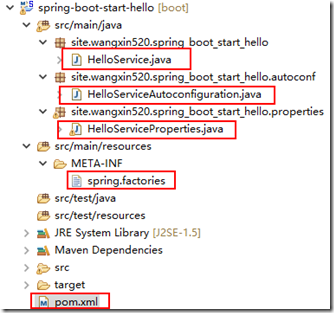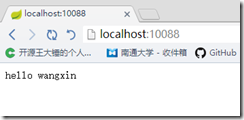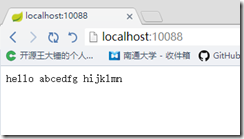start pom是springboot中提供的简化企业级开发绝大多数场景的一个工具,利用好strat pom就可以消除相关技术的配置得到自动配置好的Bean。
举个例子,在一般使用中,我们使用基本的spring-boot-starter配置基本的springboot项目,也使用spring-boot-starter-web去配置web项目,
<dependencies> <dependency> <groupId>org.springframework.boot</groupId> <artifactId>spring-boot-starter</artifactId> </dependency> <dependency> <groupId>org.springframework.boot</groupId> <artifactId>spring-boot-starter-web</artifactId> </dependency> </dependencies>
spring boot官方也给我们提供了很多start pom,当然除了官方的start pom外,我们也可以使用一些第三方为spring boot写的start pom。
本篇文章,则是介绍一个自己写start pom的方法,当能熟练使用这个之后,便可以实现自定义快速编程,敏捷开发了。
- 首先,先新建一个maven工程,在pom文件中引入spring-boot-autoconfigure依赖
pom文件
<project xmlns="http://maven.apache.org/POM/4.0.0" xmlns:xsi="http://www.w3.org/2001/XMLSchema-instance" xsi:schemaLocation="http://maven.apache.org/POM/4.0.0 http://maven.apache.org/xsd/maven-4.0.0.xsd"> <modelVersion>4.0.0</modelVersion> <groupId>site.wangxin520</groupId> <artifactId>spring-boot-start-hello</artifactId> <version>0.0.1-SNAPSHOT</version> <name>spring-boot-start-hello</name> <description>自定义的一个spring boot的start pom</description> <dependencies> <dependency> <groupId>org.springframework.boot</groupId> <artifactId>spring-boot-autoconfigure</artifactId> <version>1.5.8.RELEASE</version> </dependency> </dependencies> </project>
新建的maven工程目录为
其中HelloService.java是我们需要在springboot中引入的实体类。
- HelloService.java如下
package site.wangxin520.spring_boot_start_hello; /** * 这个是Bean类,用于在spring boot中使用的 * * @author wangXgnaw * */ public class HelloService { // 私有属性,与下面的set和get方法一起,用于注入 private String msg; /** * 打招呼的类,用于在spring boot中调用 * * @return */ public String sayHello() { return "hello " + msg; } public String getMsg() { return msg; } public void setMsg(String msg) { this.msg = msg; } }
- HelloServiceProperties.java相当于是读取到的application.properties中的配置注入到HelloService中,或者说是当没有配置的话,就注入默认配置
package site.wangxin520.spring_boot_start_hello.properties; import org.springframework.boot.context.properties.ConfigurationProperties; /** * 这个是类型安全属性的获取,用于配置自动注入bean的参数 * * @author wangXgnaw * */ @ConfigurationProperties(prefix = "hello") public class HelloServiceProperties { // 默认的配置的值 private final static String MSG = "wangxin"; // 由于在configuationProperties中配置了前缀,所以可以在application.properties中使用hello.msg配置该值。 private String msg = MSG; // 这里的get和set方法,是方便外部注入参数值用的,需要注意的是这里和HelloService不同,并没有让properties中的参数直接注入到HelloService中 public String getMsg() { return msg; } public void setMsg(String msg) { this.msg = msg; } }
- HelloServiceAutoconfiguration.java是自动注入的一个配置,与spring相关
package site.wangxin520.spring_boot_start_hello.autoconf; import org.springframework.beans.factory.annotation.Autowired; import org.springframework.boot.autoconfigure.condition.ConditionalOnClass; import org.springframework.boot.autoconfigure.condition.ConditionalOnMissingBean; import org.springframework.boot.autoconfigure.condition.ConditionalOnProperty; import org.springframework.boot.context.properties.EnableConfigurationProperties; import org.springframework.context.annotation.Bean; import org.springframework.context.annotation.Configuration; import site.wangxin520.spring_boot_start_hello.HelloService; import site.wangxin520.spring_boot_start_hello.properties.HelloServiceProperties; /** * 自动配置类,给bean注入参数 * * @author wangXgnaw * */ @Configuration // 标记当前类是配置类 @EnableConfigurationProperties(HelloServiceProperties.class) // 使用java类作为配置文件 @ConditionalOnClass(HelloService.class) // 需要被配置的类 @ConditionalOnProperty(prefix = "hello", value = "enable", matchIfMissing = true) public class HelloServiceAutoconfiguration { // 自动注入配置 @Autowired private HelloServiceProperties helloServiceProperties; /** * 给bean注入参数,同时返回一个bean实例 * 同时注解表名,返回是一个bean实例 * 当容器中没有这个bean实例的时候,就返回一个自动注入好参数的bean实例回去 * @return HelloService */ @Bean @ConditionalOnMissingBean(HelloService.class) public HelloService helloService() { HelloService helloService = new HelloService(); helloService.setMsg(helloServiceProperties.getMsg()); return helloService; } }
- spring.factories在src/main/resources中,添加一个文件夹,即META-INF,然后添加一个文件spring.factories
org.springframework.boot.autoconfigure.EnableAutoConfiguration=site.wangxin520.spring_boot_start_hello.autoconf.HelloServiceAutoconfiguration
这个文件里面,标注出自动注入的配置文件
以上就是全部的start pom案例,当写完后,使用maven的install安装到本地仓库后,在创建好springboot之后,添加上依赖,就可以很方便的使用了。
下面是springboot中引用自定义startpom依赖的实例:
- pom文件
<?xml version="1.0" encoding="UTF-8"?> <project xmlns="http://maven.apache.org/POM/4.0.0" xmlns:xsi="http://www.w3.org/2001/XMLSchema-instance" xsi:schemaLocation="http://maven.apache.org/POM/4.0.0 http://maven.apache.org/xsd/maven-4.0.0.xsd"> <modelVersion>4.0.0</modelVersion> <groupId>site.wangxin520</groupId> <artifactId>springboot-starter-test</artifactId> <version>0.0.1-SNAPSHOT</version> <packaging>jar</packaging> <name>springboot-starter-test</name> <description>springboot学习</description> <parent> <groupId>org.springframework.boot</groupId> <artifactId>spring-boot-starter-parent</artifactId> <version>1.5.8.RELEASE</version> <relativePath/> <!-- lookup parent from repository --> </parent> <properties> <project.build.sourceEncoding>UTF-8</project.build.sourceEncoding> <project.reporting.outputEncoding>UTF-8</project.reporting.outputEncoding> <java.version>1.7</java.version> </properties> <dependencies> <dependency> <groupId>org.springframework.boot</groupId> <artifactId>spring-boot-starter</artifactId> </dependency> <dependency> <groupId>org.springframework.boot</groupId> <artifactId>spring-boot-starter-test</artifactId> <scope>test</scope> </dependency> <dependency> <groupId>org.springframework.boot</groupId> <artifactId>spring-boot-starter-web</artifactId> </dependency> <dependency> <groupId>site.wangxin520</groupId> <artifactId>spring-boot-start-hello</artifactId> <version>0.0.1-SNAPSHOT</version> </dependency> </dependencies> <build> <plugins> <plugin> <groupId>org.springframework.boot</groupId> <artifactId>spring-boot-maven-plugin</artifactId> </plugin> </plugins> </build> </project>
代码中标黄了的就是我们自定义的一个startpom依赖坐标。
- 在启动类中,我们就可以使用自定义的helloservice类了。
package site.wangxin520.springbootstartertest; import org.springframework.beans.factory.annotation.Autowired; import org.springframework.boot.SpringApplication; import org.springframework.boot.autoconfigure.SpringBootApplication; import org.springframework.web.bind.annotation.RequestMapping; import org.springframework.web.bind.annotation.RestController; import site.wangxin520.spring_boot_start_hello.HelloService; @SpringBootApplication @RestController public class SpringbootStarterTestApplication { @Autowired private HelloService helloService; @RequestMapping("/") public String index(){ return helloService.sayHello(); } public static void main(String[] args) { SpringApplication.run(SpringbootStarterTestApplication.class, args); } }
- 实际操作:
可见,已经自动注入进去了。当我们在application.properties中自行配置的时候,如下
- 得到结果为
可见,我们自定义的start pom成功了!







